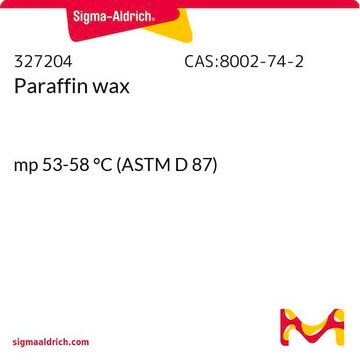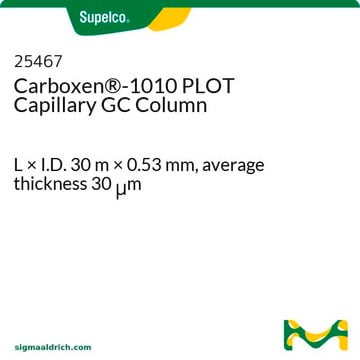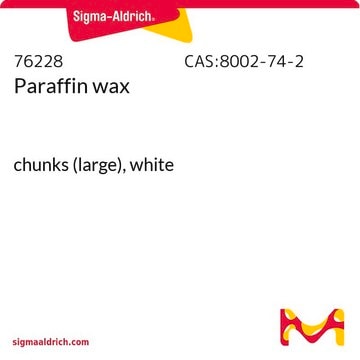Recommended Products
grade
SAJ first grade
form
solid
availability
available only in Japan
dilution
(for analytical testing)
mp
62-64 °C
InChI key
JWHAUXFOSRPERK-UHFFFAOYSA-N
Looking for similar products? Visit Product Comparison Guide
Storage Class Code
13 - Non Combustible Solids
WGK
nwg
Flash Point(F)
602.6 °F - Pensky-Martens closed cup
Flash Point(C)
317 °C - Pensky-Martens closed cup
Personal Protective Equipment
dust mask type N95 (US), Eyeshields, Gloves
Choose from one of the most recent versions:
Already Own This Product?
Find documentation for the products that you have recently purchased in the Document Library.
Xue-Tong Wang et al.
Environmental science and pollution research international, 20(7), 4742-4749 (2013-01-08)
Short-chain chlorinated paraffins (SCCPs) are extremely complex technical mixtures of polychlorinated n-alkanes with carbon chain lengths from C10 to C13 and chlorine content between 49 and 70%. SCCPs are under consideration for inclusion in the Stockholm Convention on persistent organic
Laiguo Chen et al.
Journal of chromatography. A, 1274, 36-43 (2013-01-05)
Accurately quantifying short chain chlorinated paraffins (SCCPs) in soil samples with gas chromatograph coupled with electron capture negative ionization mass spectrometry (GC-ECNI-MS) is difficult because many other polychlorinated pollutants are present in the sample matrices. These pollutants (e.g., polychlorinated biphenyls
Zhi-Yong Zhang et al.
Journal of hazardous materials, 243, 105-111 (2012-10-31)
In this study, nanoscale zero-valent iron (NZVI) particles were synthesized and used for the reductive dehalogenation of short chain chlorinated paraffins (SCCPs) in the laboratory. The results show that the dechlorination rate of chlorinated n-decane (CP(10)) by NZVI increased with
Lindy Rauscher et al.
Journal of hazardous materials, 241-242, 441-449 (2012-10-24)
Surface waters impacted by urban runoff in metropolitan areas are becoming increasingly contaminated with polycyclic aromatic hydrocarbons (PAHs). Slow-release oxidant candles (paraffin-KMnO(4)) are a relatively new technology being used to treat contaminated groundwater and could potentially be used to treat
Roman Zimmermann et al.
Plant physiology, 152(1), 356-365 (2009-11-21)
In an approach to study lateral root development in monocots, genome-wide searches for homologs of the Gibberellic Acid Stimulated Transcript-like (GAST-like) gene family in rice (Oryza sativa) and maize (Zea mays) were carried out. Six novel GAST-like genes in rice
Our team of scientists has experience in all areas of research including Life Science, Material Science, Chemical Synthesis, Chromatography, Analytical and many others.
Contact Technical Service








